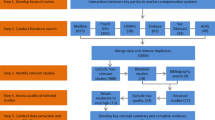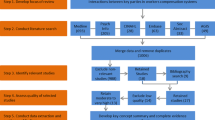Abstract
Poor mental health is a common occurrence among workers recovering from a work-related injury or illness. The objective of this cross-sectional study was to estimate the association between adverse interactions with workers’ compensation case managers and experiencing a serious mental illness 18-months following a workplace injury or illness. A cohort of 996 workers’ compensation claimants in Ontario Canada were interviewed 18 months following a disabling work-related injury or illness. Perceptions of informational and interpersonal justice in case manager interactions were defined as the primary independent variables, and Kessler Psychological Distress (K6) scores greater than 12, indicative of a serious mental illness, was defined as the outcome. Multivariate modified Poisson models estimated the association between perceptions of adverse case manager interactions and a serious mental illness, following adjustment for sociodemographic and work characteristics and pre-injury mental health. The prevalence of serious mental illness at 18 months was 16.6%. Low perceptions of informational justice, reported by 14.4% of respondents, were associated with a 2.58 times higher risk of serious mental illness (95% CI 1.30–5.10). Moderate and low perceptions of interpersonal justice, reported by 44.1% and 9.2% of respondents respectively, were associated with a 2.01 and 3.57 times higher risk of serious mental illness (95% CI moderate: 1.18–3.44, 95% CI poor: 1.81–7.06). This study provides further support for the impact of poor interactions with claims case managers on mental health, highlighting the importance of open and fair communication with workers’ compensation claimants in ensuring timely recovery and return-to-work.

Similar content being viewed by others
Data Availability
The datasets analyzed during the current study are not publicly available but are available from the corresponding author on reasonable request.
References
Mason S, Wardrope J, Turpin G, Rowlands A. Outcomes after injury: a comparison of workplace and nonworkplace injury. J Trauma. 2002;53(1):98–103.
Zelle BA, Panzica M, Vogt MT, Sittaro NA, Krettek C, Pape HC. Influence of workers’ compensation eligibility upon functional recovery 10 to 28 years after polytrauma. The Am J Surgery. 2005;190(1):30–6.
Harris I, Mulford J, Solomon M, van Gelder JM, Young J. Association between compensation status and outcome after surgery: a meta-analysis. JAMA. 2005;293(13):1644–52.
Gu JK, Charles LE, Fekedulegn D, Ma CC, Violanti JM, Andrew ME. Occupational injury and psychological distress among US workers: the National Health Interview Survey, 2004–2016. J Saf Res. 2020;74:207–17.
Kim J. Depression as a psychosocial consequence of occupational injury in the US working population: findings from the medical expenditure panel survey. BMC Public Health. 2013;13(1):303.
Orchard C, Carnide N, Mustard C, Smith PM. Prevalence of serious mental illness and mental health service use after a workplace injury: a longitudinal study of workers’ compensation claimants in Victoria Australia. Occup Environ Med. 2020;77(3):185–7.
Carnide N, Franche R-L, Hogg-Johnson S, Côté P, Breslin FC, Severin CN, et al. Course of depressive symptoms following a workplace injury: A 12-month follow-up update. J Occup Rehabil. 2016;26(2):204–15.
Chin WS, Shiao JSC, Liao SC, Kuo CY, Chen CC, Guo YL. Depressive, anxiety and post-traumatic stress disorders at six years after occupational injuries. Eur Arch Psychiatry Clin Neurosci. 2017;267(6):507–16.
Lin KH, Shiao JSC, Guo NW, Liao SC, Kuo CY, Hu PY, et al. Long-term psychological outcome of workers after occupational injury: prevalence and risk factors. J Occup Rehabil. 2014;24(1):1–10.
Chu PC, Chin WS, Guo YL, Shiao JSC. Long-term effects of psychological symptoms after occupational injury on return to work: A 6-Year Follow-Up: international journal of environmental research and public health. Eur Arch Psychiatry Clin Neurosci. 2019;16(2):235.
Jetha A, Le Pouésard M, Mustard C, Backman C, Gignac MAM. Getting the message right: evidence-based insights to improve organizational return-to-work communication practices. J Occup Rehabil. 2021.
Murgatroyd DF, Casey PP, Cameron ID, Harris IA. The effect of financial compensation on health outcomes following musculoskeletal injury: systematic review. PLoS ONE. 2015;10(2):e0117597.
Orchard C, Carnide N, Smith P. How does perceived fairness in the workers’ compensation claims process affect mental health following a workplace injury? J Occup Rehabil. 2020;30:40–8.
National Institute of Mental Health. Mental Illness [Internet]. Bethesda, MD: National Institute of Mental Health; 2021. Available from: https://www.nimh.nih.gov/health/statistics/mental-illness.shtml#:~:text=Serious%20mental%20illness%20(SMI)%20is,or%20more%20major%20life%20activities.
WSIB Ontario. Report Builder: By the numbers [Internet]. Toronto ON: WSIB Ontario; [date unknown]. Available from: http://www.divxy123.ca/ReportBuilder2019/Pages/report_builder.php.
Kessler RC, Barker PR, Colpe LJ, et al. Screening for serious mental illness in the general population. Arch Gen Psychiatry. 2003;60(2):184–9.
Furukawa TA, Kessler RC, Slade T, Andrews G. The performance of the K6 and K10 screening scales for psychological distress in the Australian National Survey of Mental Health and Well-Being. Psychol Med. 2003;33(2):357–62.
Franche RL, Carnide N, Hogg-Johnson S, Cote P, Breslin FC, Bultmann U, et al. Course, diagnosis, and treatment of depressive symptomatology in workers following a workplace injury: a prospective cohort study. Can J Psychiatry. 2009;54(8):534–46.
Newman DA. Missing data: five practical guidelines. Organ Res Methods. 2014;17(4):372–411.
Greenland S. Regression methods for epidemiologic analysis. In: Ahrens W, Pigeot I, editors. Handbook of epidemiology. Heidelberg: Springer; 2005. p. 625–91.
Zou GY, Donner A. Extension of the modified Poisson regression model to prospective studies with correlated binary data. Stat Methods Med Res. 2011;22(6):661–70.
Zou G. A modified poisson regression approach to prospective studies with binary data. Am J Epidemiol. 2004;159(7):702–6.
Ioannou LJ, Cameron PA, Gibson SJ, Gabbe BJ, Ponsford J, Jennings PA, et al. Traumatic injury and perceived injustice: fault attributions matter in a “no-fault” compensation state. PLoS ONE. 2017;12(6):e0178894.
Segrin C. Social skills deficits associated with depression. Clin Psychol Rev. 2000;20(3):379–403.
Funding
This work was funded by the Grants Program at the Ontario Workplace Safety & Insurance Board.
Author information
Authors and Affiliations
Corresponding author
Ethics declarations
Conflict of interest
On behalf of all authors, the corresponding author states that there is no conflict of interest.
Ethical Standards
This study was approved by the University of Toronto Health Sciences Research Ethics Board and have therefore been performed in accordance with the ethical standards laid down in the 1964 Declaration of Helsinki and its later amendments. All participants gave their informed consent prior to their inclusion in the study.
Additional information
Publisher's Note
Springer Nature remains neutral with regard to jurisdictional claims in published maps and institutional affiliations.
Supplementary Information
Below is the link to the electronic supplementary material.
Rights and permissions
About this article
Cite this article
Orchard, C., Carnide, N., Smith, P. et al. The Association Between Case Manager Interactions and Serious Mental Illness Following a Physical Workplace Injury or Illness: A Cross-Sectional Analysis of Workers’ Compensation Claimants in Ontario. J Occup Rehabil 31, 895–902 (2021). https://doi.org/10.1007/s10926-021-09974-7
Accepted:
Published:
Issue Date:
DOI: https://doi.org/10.1007/s10926-021-09974-7




